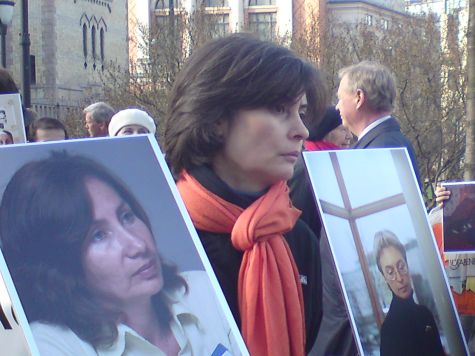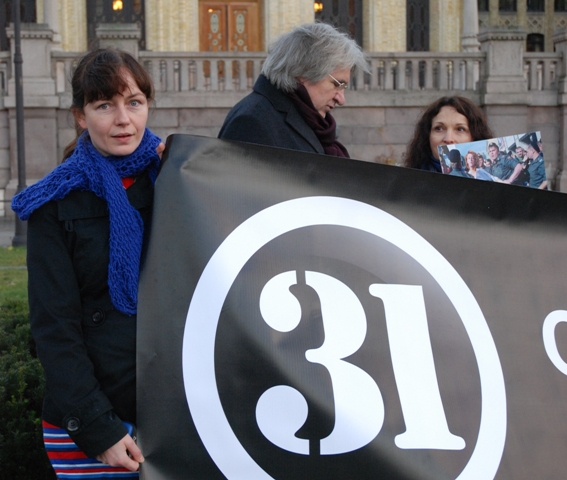 In April, The Norwegian Helsinki Committee and the Human Rights House Foundation took part in an international conference for human rights defenders, the Oslo Freedom Forum 2010, in Christiania Theatre.
In April, The Norwegian Helsinki Committee and the Human Rights House Foundation took part in an international conference for human rights defenders, the Oslo Freedom Forum 2010, in Christiania Theatre.
Focus on the Russian Federation
In his presentation at the Oslo Freedom Forum’s last day, Bjørn Engesland, secretary general of the Norwegian Helsinki Committee, said that the main goal of human rights activists is to challenge governments to become bolder in criticising abuses and standing up for human rights defenders.
These were not just empty words from Engesland. The NGO forum for human rights sent a letter to the Norwegian Minister of Foreign Affairs Jonas Gahr Støre on February 18 with its recommendations for cases in need of particular attention during 2010 years’ sessions in the UN Human Rights Council, in the general Assembly and in Norway’s bilateral consultations.
Assembly and in Norway’s bilateral consultations.
The recommendations highlighted the worsening human rights situation in the Russian Federation, where the situation in the North Caucasus is particularly alarming.
Problematic N. Caucasus
the Russian Federation and the Northern Caucasus region was especially relevant this year.
Amnesty International, the Norwegian Helsinki Committee and the Human Rights House Foundation staged a silent protest (above) on 27 April outside the hotel where President Dimitri Medvedev has been staying during his visit to Norway.
It so happened that Oslo Freedom Forum coincided with Medvedev’s visit.
On 31 October Eight Norwegian nongovernmental human rights organisations, including Amnesty International Norway, the Norwegian Helsinki Committee and Human Rights House Foundation, showed their support to a pro-democracy civil Russian movement “Strategy 31“ by organising a demonstration, below, in Oslo in front of the Norwegian Parliament.
The Norwegian Helsinki Committee in cooperation with the Norwegian Institute of International Affairs on 23 March 2010 also organized a seminar in which Russia’s harsh policies pursued during continuous anti-terrorist operations in the North Caucasus region were analyzed an d discussed by human rights defenders and experts.
d discussed by human rights defenders and experts.
One more important issue in 2010 concerning the Russian Federation was the establishment of the Natalia Estemirova Documentation Center in Oslo. The center was established by nine international non-governmental organizations, including the Norwegian Helsinki Committee.
Oslo NGOs also joined various petitions and letters of concern regarding the situation of human rights in the Russian Federation and its North Caucasus region.
Central Asia
Also in April, the Norwegian Helsinki Committee launched its small grants program for Kazakhstan, Kyrgyzstan and Tajikistan. Under the program, applications for grant support could be submitted by all legally registered organizations with project proposals to promote human rights and democracy in the three Central Asian countries.
 In May, shortly after the opening of a new Norwegian embassy in Kazakhstan and Crown Prince Haakon’s visit to the country, the Oslo Center for Peace and Human Rights and the Norwegian Helsinki Committee, right, presented a draft report on freedom of religion and belief to foreign minister Kanat Saudabayev in Kazakhstan’s capital Astana.
In May, shortly after the opening of a new Norwegian embassy in Kazakhstan and Crown Prince Haakon’s visit to the country, the Oslo Center for Peace and Human Rights and the Norwegian Helsinki Committee, right, presented a draft report on freedom of religion and belief to foreign minister Kanat Saudabayev in Kazakhstan’s capital Astana.
According to the report, in spite of making interreligious dialogue a priority for its Organization on Security and Cooperation in Europe (OSCE) chairmanship, Kazakhstan is not fully implementing its obligations to respect freedom of religion or belief.
Norwegian Helsinki Committee on a 30 June Side Event of the 2010 OSCE Tolerance Conference presented a new report “Broken promises: freedom of religion and belief issues in Kazakhstan and Kyrgyzstan”. The report details freedom of religion or belief issues in Kazakhstan and Kyrgyzstan and presents recommendations in order to bring the countries in line with relevant international human rights standards.
The report was prepared by five human rights organizations.
Crisis in Kyrgyzstan
After the outbreak of the crisis in Kyrgyzstan, Norwegian activists got involved trying to stop continued human rights violations in the region.
A team from the Norwegian Helsinki Committee and Russia-based Human Rights Center Memorial visited a number of towns and districts in southern Kyrgyzstan in June and again in July 20 10, speaking with representatives of all ethnic groups, as well as with a number of government representatives and with Kyrgyzstan’s President.
10, speaking with representatives of all ethnic groups, as well as with a number of government representatives and with Kyrgyzstan’s President.
The team members were witnesses of violence that took lives on both sides of the ethnic divide.
There were more initiatives criticizing the human rights situation in Kazakhstan and other countries in the region and giving the recommendations how to improve the situation. One of them was Norwegian Helsinki Committee’s report “Persona Non Grata” (below).
It says that six members of the Commonwealth of Independent States (CIS) have developed a common system, where individuals who are denied entry to one of the six member states automatically are denied entry to the others. According to report, this means an attempt of the states to limit contact between human rights activists at home with their colleagues abroad.
Other countries and regions
The grave situation of human rights in Iran, Azerbaijan, Belarus, the People´s Republic of China and especially in Burma was on top priority list for Oslo NGOs.
Iran, Azerbaijan, Belarus, the People´s Republic of China and especially in Burma was on top priority list for Oslo NGOs.
The main focus of Norwegian Burma Committee was the “elections” in the country. The upcoming election in Burma was discussed on 26 April 2010 at a seminar in Oslo, which was organized by by the Oslo Center, in cooperation with Norwegian Church Aid, the Norwegian Baptist Society and the Norwegian Burma Committee.
Norway was criticized by its own non governmental organizations regarding the migrants who have had their asylum applications rejected, but cannot return to their home countries for whatever reason. The similar situation was and a year before.


